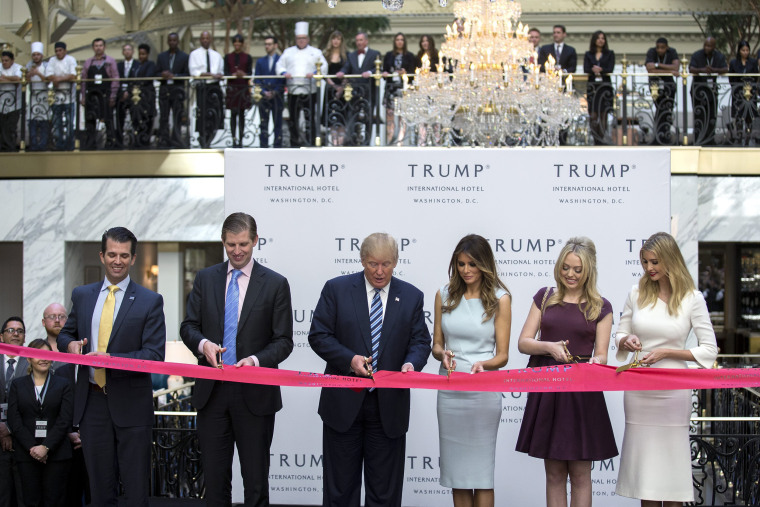First Read is a morning briefing from Meet the Press and the NBC Political Unit on the day's most important political stories and why they matter.
Why Trump’s business dealings matter
You can add another example to the list of actions that President-elect Trump has taken that mixes his business interests with his new office. Just days after defeating Hillary Clinton, Trump told British nationalist politician Nigel Farage to “oppose the kind of offshore wind farms that Mr. Trump believes will mar the pristine view from one of his two Scottish golf courses,” the New York Times reported. Soon after the publication of that article last night, Trump suggested that the conversation with Farage wasn’t a big deal. “Prior to the election it was well known that I have interests in properties all over the world. Only the crooked media makes this a big deal!” he tweeted. But here’s why Trump’s post-election business dealings matter: They could potentially violate the Constitution’s little-known Emoluments Clause.
Get to know the Emoluments Clause
The Constitution states, “No Title of Nobility shall be granted by the United States: And no Person holding any Office of Profit or Trust under them, shall, without the Consent of the Congress, accept of any present, Emolument, Office, or Title, of any kind whatever, from any King, Prince, or foreign State” (the emphasis is ours). As the New York Times writes, “emolument” means compensation for labor or services, and President Obama’s Justice Department looked at the matter when he won the Nobel Peace Prize, which included a $1.4 million check. The Justice Department lawyer “concluded that Mr. Obama could accept the prize because the committee that chose him was independent of the Norwegian government and the prize itself was privately financed. But he said that the answer would be different if a foreign government sought to make a payment to a sitting president. In a footnote, [the lawyer] added, ‘Corporations owned or controlled by a foreign government are presumptively foreign states under the Emoluments Clause.’”
Any profit Trump might make from a foreign government-backed company could be a violation
And, of course, Trump still has plenty of business ties with corporations tied with foreign governments. His “ventures include multimillion-dollar real estate arrangements — with Mr. Trump’s companies either as a full owner or a ‘branding’ partner — in Ireland and Uruguay. The Bank of China is a tenant in Trump Tower and a lender for another building in Midtown Manhattan where Mr. Trump has a significant partnership interest,” the Times adds. The reason why the Emoluments Clause hasn’t been much of a topic before is that past presidents have disassociated themselves from their business dealings. That isn’t the case with Trump. At least not yet.
The executive actions Trump plans to take on his first day
“President-elect Donald Trump on Monday announced a list of ‘executive actions’ he plans to implement on the first day of his presidency meant to "restore our laws and bring back our jobs,” one of us writes. “Trump said he will signal the United States' intention to:
- withdraw from the Trans-Pacific Partnership;
- roll back energy regulations
- take steps to guard against cyber attacks;
- investigate visa program abuses;
- and implement rules against members of his administration leaving to become lobbyists.
Noticeably absent in the video announcing these upcoming moves: Nothing on a border wall, nothing on Obamacare, and nothing on Obama’s executive actions on immigration.
Cabinet Watch
Here is our running list of possible candidates we’ve been hearing about so far. We’ll continue to update it as the president-elect’s team makes its choices final.
- Secretary of State: Rudy Giuliani, John Bolton, Nikki Haley, Bob Corker, Mitt Romney
- Attorney General: Giuliani, Jeff Sessions OFFERED
- Treasury: Steve Mnuchin, Jeb Hensarling
- Defense: Jim Talent, Tom Cotton
- Homeland: Michael McCaul, David Clarke
- Interior: Sarah Palin, Mary Fallin
- HHS: Ben Carson (adviser says he’s declined)
- Education: Carson (adviser says he’s declined), Michelle Rhee
- Commerce: Lew Eisenberg, Linda McMahon, Wilbur Ross
- Transportation: John Mica, Deb Fischer, Lou Barletta, Elaine Chao
- Agriculture: Rick Perry, Sid Miller
- CIA Director: Mike Pompeo OFFERED
- UN Ambassador: Richard Grenell
- National Security Adviser: Michael Flynn OFFERED
- RNC Chair: Ronna Romney McDaniel, David Urban
Bernie Sanders: “It is not good enough for someone to say, ‘I’m a woman! Vote for me!”
Vox: “This is where there is going to be division within the Democratic Party,” Sanders said Sunday in Boston, according to Boston Magazine reporter Kyle Scott Clauss. “One of the struggles that you’re going to be seeing in the Democratic Party is whether we go beyond identity politics.” More: “I think it's a step forward in America if you have an African-American head or CEO of some major corporation,” Sanders said. “But you know what? If that guy is going to be shipping jobs out of this country and exploiting his workers, it doesn't mean a whole hell of a lot if he's black or white or Latino.” More: “It is not good enough for someone to say, 'I'm a woman! Vote for me!’” he continued. “No, that's not good enough. What we need is a woman who has the guts to stand up to Wall Street, to the insurance companies, to the drug companies.”



